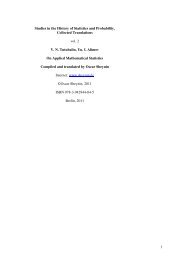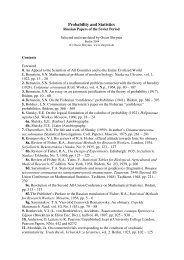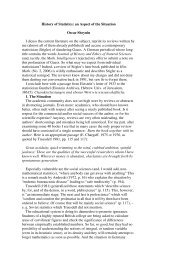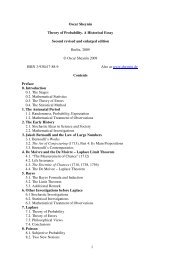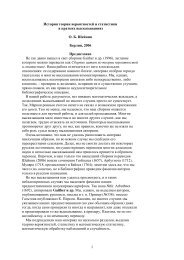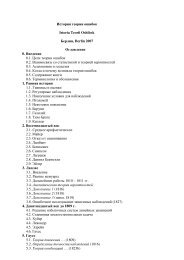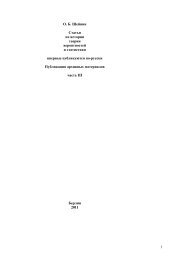11. Kolmogorov, A.N. Grundbegriffe der Wahrscheinlichkeitsrechnung.Berlin, 1933. {Russian translation, 1936.}12.{The Russian phrase is not sufficiently clear, <strong>and</strong> its translation is tentative.}13. Earlier Mises only furnished an estimate of their mean value <strong>and</strong> variance.14. We note for example that some of our establishments have spent years for compilingtables of the coefficients of correlation between a large number of studied quantities. Ifadequate devices are available, such work can be done almost at once.6. A.N. Kolmogorov. The Role of the Russian Sciencein the Development of the Theory of <strong>Probability</strong>Uchenye Zapiski Moskovsk. Gosudarstven. Univ., No. 91, 1947, pp. 53 – 64 …1. The theory of probability occupies a peculiar position among other sciences. R<strong>and</strong>omphenomena admitting an estimate of their probabilities occur in mechanics, physics <strong>and</strong>chemistry as well as in biology <strong>and</strong> social domains. Accordingly, probability theory has nospecial <strong>and</strong> exclusive field, it is applicable to any sphere of the real world. At the same time,the theory is not a part of pure mathematics since the notions of causality, r<strong>and</strong>omness,probability cannot be considered as belonging to the latter. This combination of greaterspecificity, <strong>and</strong> greater richness in concepts taken from concrete reality as compared withpure mathematics, on the one h<strong>and</strong>, with complete generality <strong>and</strong> applicability to mostvarious fields of real phenomena, on the other h<strong>and</strong>, imparts special attraction to probabilitytheory, but at the same time engenders peculiar difficulties in mastering it broad-mindedly<strong>and</strong> creatively.In a certain sense, the theory of probability can be converted into pure mathematics, <strong>and</strong>this is accomplished by its axiomatization. According to the axiomatic exposition, <strong>and</strong>issuing for example from the system developed in my book on the main concepts of thetheory of probability, events are replaced by sets whose elements are elementary events, <strong>and</strong>probability simply becomes an additive non-negative function of these sets. Formallyspeaking, the theory of probability is converted into a pure mathematical discipline, <strong>and</strong>,more precisely, into a special part of the abstract theory of measures of sets <strong>and</strong> metric theoryof functions. However, from the viewpoint of such a formal reduction of probability tomeasure theory, the former’s main specific problems become extremely artificial <strong>and</strong> special;the ideological orientation of the entire development of probability theory is obscured, <strong>and</strong>,finally, the possibility of a specifically stochastic intuitive prediction of results is lost.In a formal sense, mechanics can be similarly considered a part of pure mathematics(mainly of the theory of differential equations). Mechanicians, however, hotly oppose this.And we, specialists in probability theory, also believe ourselves to be representatives of aspecial science possessing its own specific style of thinking. Cultivating a total mathematicalformal rigor, also possible in many branches of mechanics, we direct all our investigations,even including the most general <strong>and</strong> abstract research, by our wish to underst<strong>and</strong> the laws ofreal r<strong>and</strong>om phenomena <strong>and</strong> the origin of rigorous causal dependence resulting from the jointoperation of a large number of independent or weakly connected r<strong>and</strong>om factors; <strong>and</strong>inversely, by our desire to comprehend the emergence of one or another probabilitydistribution resulting from the superposition of small r<strong>and</strong>om perturbations on a rigorouscausal dependence, etc. Just as the mechanicians, who especially appreciate researchers bothmastering the analytical mechanical tools <strong>and</strong> having a mechanician common sense <strong>and</strong>intuition, – just the same, we make some distinction between pure analysts engaged inisolated problems posed by probability theory, <strong>and</strong> specialists in the theory proper, who,issuing from visual stochastic considerations, often perceive the solution of problems fromthe very beginning, before finding the appropriate analytic tools.
2. The history of probability theory may be tentatively separated into four portions of time.The first period, when the elements of our science were created, is connected with the namesof Pascal (1623 – 1662), Fermat (1601 – 1665) <strong>and</strong> especially Jakob Bernoulli (1654 – 1705).The second one lasted throughout the 18 th , <strong>and</strong> the beginning of the 19 th century: De Moivre(1667 – 1754), Laplace (1749 – 1827), Gauss (1777 – 1855) <strong>and</strong> Poisson (1781 – 1840). Thethird period, i.e., the second half of the 19 th century, is largely connected with the names ofRussian scientists, Chebyshev (1821 – 1894), Markov (1856 – 1922) <strong>and</strong> Liapunov (1857 –1918). In Western Europe, general theoretical research in probability theory during this timeremained somewhat in the background. With regard to its theoretical stochastic methods, theemerging mathematical statistics (Quetelet, Cournot, Galton, K. Pearson, Bruns,Bortkiewicz) mainly managed with the results of the previous period, whereas the newrequirements made by statistical physics were not yet sufficiently expressed in generalcontributions on the theory of probability. In Russia, meanwhile, almost exclusively by theefforts of the three abovementioned celebrated mathematicians, the entire system of thetheory was reconstructed, broadened <strong>and</strong> essentially deepened. Their work formed a solidbasis for the development of probability theory during the fourth period, the beginning of the20 th century. This was the time of a general strengthening of interest in the theory asmanifested in all countries, <strong>and</strong> of an extraordinary broadening of its field of application invarious special branches of natural sciences, technology <strong>and</strong> social sciences. Although the<strong>Soviet</strong> {school of} probability does not possess such an exclusive place in this intensiveinternational scientific work as the one that fell to the lot of the classical Russian research ofthe previous period, it seems to me that its rank is also very significant, <strong>and</strong> that, with regardto the general problems of the probability theory itself, it even occupies the first place.3. Russian scientists did not participate in the work of the first period, when the mainelementary concepts of our science, the elementary propositions such as the addition <strong>and</strong> themultiplication theorems, <strong>and</strong> the elementary arithmetical <strong>and</strong> combinatorial methods wereestablished. The concrete material studied mostly amounted to problems in games of chance(dice, playing cards, etc). Paradoxically, however, this was mainly a philosophical period inthe development of the theory of probability.It was the time when mathematical natural science was created. The goal of the epoch wasto comprehend the unusual broadness <strong>and</strong> flexibility (<strong>and</strong>, as it appeared then, omnipotence)of the mathematical method of studying causal ties. The idea of a differential equation as alaw uniquely determining the forthcoming evolution of a system, given its present state,occupied an even more exclusive place in the mathematical natural science than it doesnowadays.For this branch of knowledge, the theory of probability is required when the deterministicpattern of differential equations is not effective anymore; at the same time, the concretenatural-scientific material for applying the theory in a calculating, or, so to say, business-likeway, was yet lacking. Nevertheless, the inevitability of coarsening real phenomena whenfitting them in with deterministic patterns of the type provided by systems of differentialequations, was already sufficiently understood. It was also clear that quite discernibleregularities may occur in the mean out of the chaos of an enormous number of phenomenadefying individual account <strong>and</strong> unconnected one with another. Exactly here the fundamentalrole of probability theory in theoretical philosophy was foreseen. Of course, just this aspectrather than the servicing of the applied problems posed by Chevalier de Méré, so stronglyattracted Pascal to probability, <strong>and</strong> (already explicitly) guided Jakob Bernoulli during thetwenty years when he was searching for a proof of his limit theorem that also nowadays isthe basis of all applications of probability theory. This proposition solved with sufficientcompleteness the main problem of theoretical philosophy encountered in the theory’s first
- Page 4 and 5: [3] I bear in mind the well-known p
- Page 6 and 7: successes of physical statistics. B
- Page 8 and 9: classes of independent facts whose
- Page 10 and 11: distribution is a corollary of the
- Page 12 and 13: examine in the first place the curv
- Page 14 and 15: 12. According to Bortkiewicz’ ter
- Page 16 and 17: generality, the similarities taking
- Page 18 and 19: one on another, as well as the corr
- Page 20 and 21: is inapplicable because the right s
- Page 22 and 23: Instead, Slutsky introduced new not
- Page 24 and 25: abandoned in August 1936, but it is
- Page 26 and 27: last decades, mathematicians more o
- Page 28 and 29: charged with making the leading ple
- Page 30 and 31: motion and a number of others) are
- Page 32 and 33: phenomena. It is self-evident that
- Page 34 and 35: Such new demands were formulated in
- Page 36 and 37: The addition of independent random
- Page 38 and 39: automatic lathes, etc. Here, the ma
- Page 42 and 43: period 1 and remained, until the ap
- Page 44 and 45: of the analytical tool rather than
- Page 46 and 47: with probability approaching unity,
- Page 48 and 49: logic. The ensuing vagueness in his
- Page 50 and 51: 2. Gnedenko, B.V. (1949), On Lobach
- Page 52 and 53: will be sufficient, although not ne
- Page 54 and 55: nlimk = 1P(| k (n) - m k (n) | > H
- Page 56 and 57: favorite classical issue as the gam
- Page 58 and 59: and some quite definite (not depend
- Page 60 and 61: influenced by a construction that a
- Page 62 and 63: P ij (1) = p ij (1) , P ij (t) =kP
- Page 64 and 65: 4.2d. Bebutov [1; 2] as well as Kry
- Page 66 and 67: are yet no limit theorems correspon
- Page 68 and 69: described, from the viewpoint that
- Page 70 and 71: conditional variance and determined
- Page 72 and 73: Romanovsky [45] and Kolmogorov [46]
- Page 74 and 75: Let S be the general population wit
- Page 76 and 77: Part 1. Russian/Soviet AuthorsAmbar
- Page 78 and 79: 2. On necessary and sufficient cond
- Page 80 and 81: Gnedenko, B.V., Groshev, A.V. 1. On
- Page 82 and 83: 52. ( (Mathematical Principl
- Page 84 and 85: Kozuliaev, P.A. 1. Sur la répartit
- Page 86 and 87: Obukhov, A.M. 1. Normal correlation
- Page 88 and 89: 30. Généralisations d’un théor
- Page 90 and 91:
22. Alcune applicazioni dei coeffic
- Page 92 and 93:
10. A.N. Kolmogorov. The Theory of
- Page 94 and 95:
Kuznetsov, Stratonovich & Tikhonov
- Page 96 and 97:
In the homogeneous case H s t = H t
- Page 98 and 99:
to such a generalization. He only s
- Page 100 and 101:
In the particular case of a charact
- Page 102 and 103:
as it is usual for the modern theor
- Page 104 and 105:
1. {The second reference to Pugache
- Page 106 and 107:
Smirnov, Romanovsky and others made
- Page 108 and 109:
determined the precise asymptotic c
- Page 110 and 111:
for finite values of N, M and R 2 .
- Page 112 and 113:
Mikhalevich’s findings by far exc
- Page 114 and 115:
Uch. Zap. = Uchenye ZapiskiUkr = Uk
- Page 116 and 117:
Khinchin, A.Ya. 43. Math. Ann. 101,
- Page 118 and 119:
7. DAN 115, 1957, 49 - 52.Pinsker,
- Page 120 and 121:
Anderson, T.W., Darling, D.A. (1952
- Page 122 and 123:
Statistical problems in radio engin
- Page 124 and 125:
observations for its power with reg
- Page 126 and 127:
securing against mistakes (A.N. Kry
- Page 128 and 129:
of the others, then its distributio
- Page 130 and 131:
In Kiev, in the 1930s, N.M. Krylov



